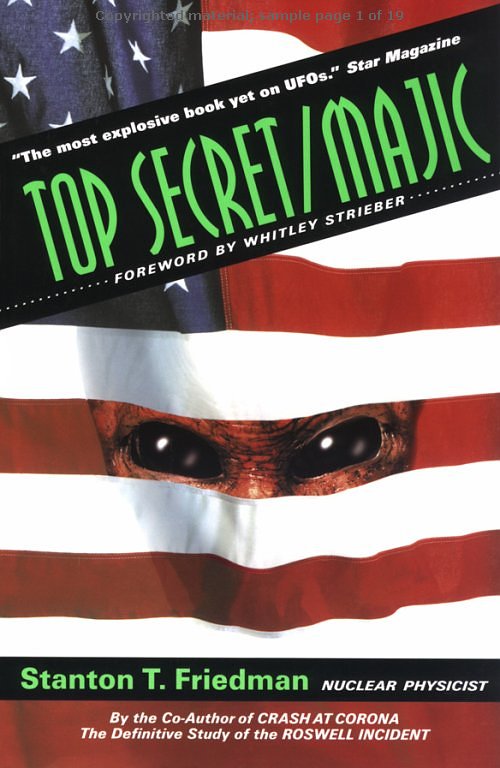

 |
For 12 years, Stanton Friedman has been researching a batch of documents that mysteriously arrived upon the doorstep of one of his colleagues in December 1984. "Top Secret / Majic" is the result of that research.
According to the documents, following the Roswell crash of 1947, President Eisenhower formed a group of scientists and military men who comprised "Majestic 12." So secret was the group and it's dealings that it was hidden under the classification "Top Secret / Majic." Since then, it is presumed, MJ-12 has been the government agency at the peak of the pyramid of UFO knowledge.
Now that we're caught up, let's get to Mr.Friedman's book.
|
The book starts out well with some great biographical background on Friedman and how he became the premier ufologist in the America. The emergence of the documents presents a problem, however. From the onset, Friedman's goal is to prove the legitimacy of said documents. He is so exhaustive in his research and compulsive in his desire to leave no stone unturned for a possible debunker that the book slows to a grinding pace. While it is important for legitimate research to be done in the field, the emergence of a "smoking gun" memo only complicates matters and increases the tedium of the book.
That said, once Friedman gets past his adventures at the Library of Congress and his detailed analysis of the document font, the book picks up the pace and improves greatly. To start with, he attacks the debunkers head on, showing why their logic is flawed and why they refuse to see the obvious. From there, it threatens to slip into another trance of insane research, however, this time Friedman, himself, debunks the new MJ-12 documents that have emerged since the previous scant few.
Far and away the final third of the book captures the spirit of the UFO field with breathtaking detail. First, Friedman reprints portions of the recovered MJ-12 Operations Manual. Seeing what the government knew in the 1950's is shocking in reflection of how little we, the public, know today.
Nearing the end of the book, Friedman details his adventures with the source of the "Alien Autopsy" film, as well as members of the media and other "experts." The in-fighting among the various elements of the ufological field give a good indication of why there are so many problems with getting answers to the questions we have struggled with since that fateful day in 1947.
|
The final chapter titled "The Bottom Line" is worth the price alone, as it contains Friedman's opinion of just such questions the UFO field has struggled with for decades. And no other expert is more qualified to tackle such issues than the man who has been in the field in 25 + years. Friedman outright states that it is now pointless to engage in a debate over whether or not UFOs are real. They are, get over it. He goes on to detail the three essential questions everyone asks and gives his opinion on what the answers may be. One, why is the goverment covering up UFO activity? Two, why would aliens come here? Three, why should we care? Friedman's answers are startling in their insight and refreshing in their honesty. |
 |
Overall, the book stands as a testament to Stanton Friedman's unending pursuit of the truth. His work is highly praised in the foreword written by Whitley Strieber who states "Friedman is the sort of man who, after being thrown down a cliff, simply picks himself up and starts climbing again." Perhaps more than any other book, this book is a worthy investment for anyone remotely interested in the work being done at the forefront of the ufology community. Though it drags at some points, is must in order to stave off the swarm of critics and debunkers waiting to attack Friedman and his work.
"Stanton Friedman is NOT a UFO buff. He IS the most outspoken, best known, and most trusted scientific ufologist in North America." So says the back cover of the book and I find it hard to disagree.